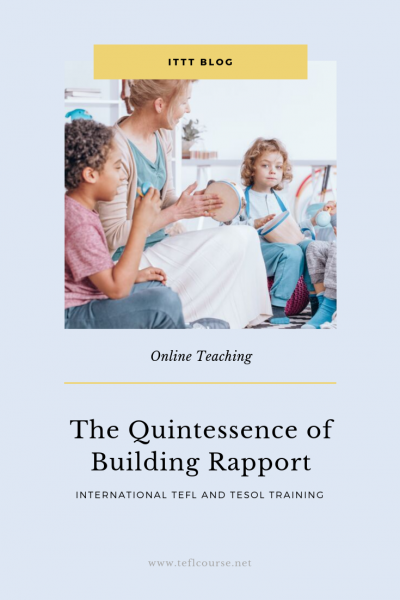The Quintessence of Building Rapport

The trust that a person has in another is one of the most important parts of communication and the first step in strengthening bonds. Establishing rapport can put any individual at ease, whether it be in the business world, classroom setting or even a neighbor. To execute efficiently, a teacher must first inspire confidence in his or her students. In this summative assessment, I will show how establishing rapport is essential to the flow of the classroom.
This post was written by our TEFL certification graduate Joseph Matthew B. Please note that this blog post might not necessarily represent the beliefs or opinions of ITTT.
Personal Experience
In my former profession, I was the manager of a successful defense contracting firm in Virginia, USA. The methods I used are almost identical to the methods one must use to establish a healthy and conducive relationship. The goal of any manager or teacher is results. If the manager is not conveying his/her message efficiently, then there is a breakdown in communication and ultimately in performance. The same can be said in a classroom setting.

Also Read: Do TEFL teachers need a second language?
Methods to Build Rapport
1. Customized Activities
One method in which a teacher can use to establish rapport is to personalize activities to a student’s interests. This is a method that I also used as a manager to gain the trust and respect of my staff. This is a means to relate to the student and can also be utilized as an effective ice breaker. For example, if I was a new teacher in Madrid I would not prompt conversation by asking “Did anyone see Leo Messi last night?”, or “Boy, Barcelona looked great last night”. I would instead start the conversation by asking “Do we like Real Madrid or Atletico Madrid?”.
This approach would elicit some good conversation and good debate while at the same time relating to the local interests of the group. This technique can be helpful to establish a class spirit. Relating to the students invokes confidence and once a relaxed atmosphere has been achieved, seating arrangements would then become a simpler task. The goal of the seating arrangements for a teacher is to create harmony and a conducive environment where each student is getting along and helping each other out.
Also Read: How To Start Your Own ESL Teaching Service
2. Grouping
A teacher must also understand when not to dominate a discussion or a lesson. A practical way in which this can be done is through group work. Pairing the students into small groups and putting some of the weaker students with the stronger students will help even the groups out and create a balance in the classroom. A teacher must not allow one student to be the dominant speaker. This can cause a sense of favoritism and predictability.

3. Class Dynamics and Discipline
Once confidence has been established between teachers and students, the next important step is to sustain this dynamic and maintain discipline. The degree in which a teacher can maintain this discipline will depend on many different factors such as age group, class size and ultimately respect between student and teacher.
How did it work for me?
As a manager, I made sure to set the tone and lead by example. I would be the first one to arrive at work and the last one to leave. When giving a task I would make sure to give concise instructions. Similar methods can be used in a classroom setting. A teacher should exude confidence by using welcoming eye contact. Eye contact, if used correctly, can be used to encourage, gain attention, give direction and maintaining discipline. A strong voice can be a key tool in maintaining classroom order. A teacher should also be aware not to make threats he or she cannot keep. Otherwise, the student will not respect you or fear any consequence. When instructing, a teacher should not sound unsure but should speak in a tone that would capture every student’s attention. As a manager, I noticed early on that when I gave presentations and sounded nervous and unsure, my staff would not clearly understand the task at hand and would have more questions. As time went on and I grew more confident in my role and ultimately in giving direction, my staff’s confidence in me grew as well.

Also Read: Top 5 Countries to Teach English Abroad for History Buffs
Preparation
A teacher can never be prepared for everything and unfortunately, there are times when problems do occur. Understanding your students may help reduce problems that arise. There can be several factors that contribute to a student having an issue, such as family problems, boredom and lack of respect for the teacher. Trust and respect must be established immediately, as this can help prevent issues arising in the classroom. As long as a teacher keeps their composure, maintains consistency, shows fairness among the students and shows a respect for the job, then the chances of an issue occurring with a student are reduced.
Do you want to teach English abroad? Take a TEFL course!
Classroom management is no different than managing staff or being a captain on a football team. The first step is always establishing a rapport with your students. Once this is attained then the process of having a friendly and relaxed atmosphere becomes easier to manage, organize and maintain discipline.
Apply now & get certified to teach english abroad!
Speak with an ITTT advisor today to put together your personal plan for teaching English abroad.
Send us an email or call us toll-free at 1-800-490-0531 to speak with an ITTT advisor today.
Related Articles:
- The Top 5 Places to Teach English in Japan | ITTT | TEFL Blog
- 10 Questions You Need to Ask Before Enrolling In a TEFL Course
- Step-By-Step Guide To Legally Teaching English in South Korea
- Online or In-Class - Which TEFL Course Should You Take?
- Teaching English Abroad: What's Next? - How To Advance In Your EFL Career
- Teaching English In China - The Salary and Budget Guide




